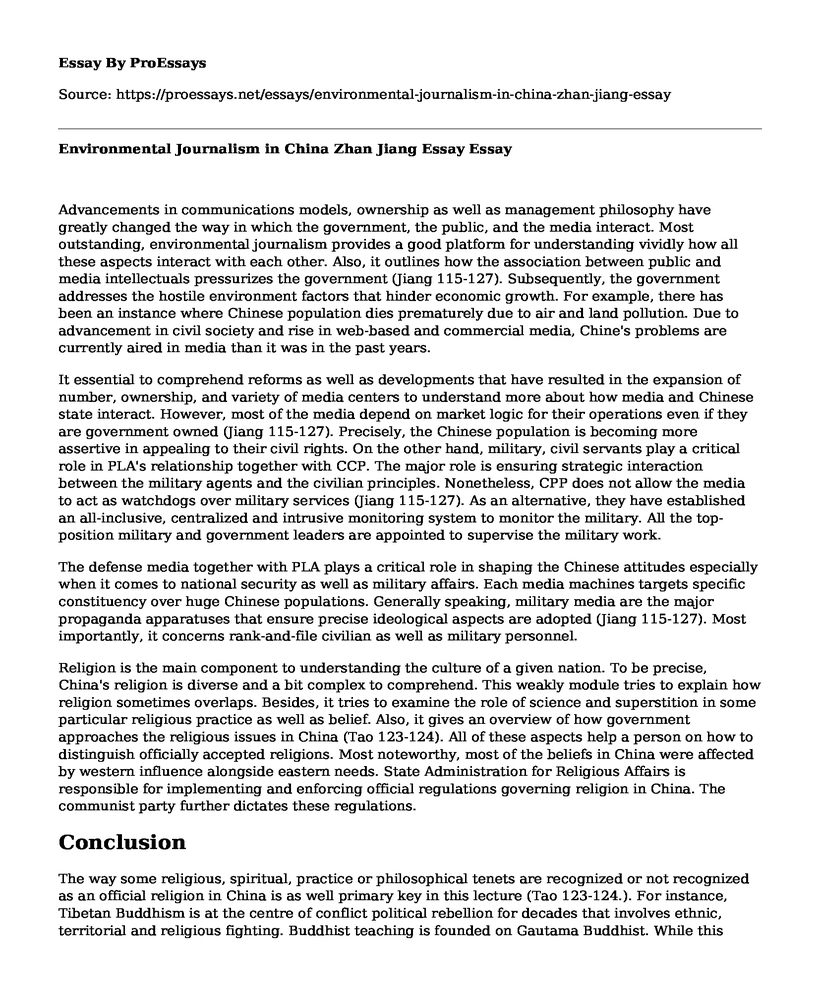Advancements in communications models, ownership as well as management philosophy have greatly changed the way in which the government, the public, and the media interact. Most outstanding, environmental journalism provides a good platform for understanding vividly how all these aspects interact with each other. Also, it outlines how the association between public and media intellectuals pressurizes the government (Jiang 115-127). Subsequently, the government addresses the hostile environment factors that hinder economic growth. For example, there has been an instance where Chinese population dies prematurely due to air and land pollution. Due to advancement in civil society and rise in web-based and commercial media, Chine's problems are currently aired in media than it was in the past years.
It essential to comprehend reforms as well as developments that have resulted in the expansion of number, ownership, and variety of media centers to understand more about how media and Chinese state interact. However, most of the media depend on market logic for their operations even if they are government owned (Jiang 115-127). Precisely, the Chinese population is becoming more assertive in appealing to their civil rights. On the other hand, military, civil servants play a critical role in PLA's relationship together with CCP. The major role is ensuring strategic interaction between the military agents and the civilian principles. Nonetheless, CPP does not allow the media to act as watchdogs over military services (Jiang 115-127). As an alternative, they have established an all-inclusive, centralized and intrusive monitoring system to monitor the military. All the top-position military and government leaders are appointed to supervise the military work.
The defense media together with PLA plays a critical role in shaping the Chinese attitudes especially when it comes to national security as well as military affairs. Each media machines targets specific constituency over huge Chinese populations. Generally speaking, military media are the major propaganda apparatuses that ensure precise ideological aspects are adopted (Jiang 115-127). Most importantly, it concerns rank-and-file civilian as well as military personnel.
Religion is the main component to understanding the culture of a given nation. To be precise, China's religion is diverse and a bit complex to comprehend. This weakly module tries to explain how religion sometimes overlaps. Besides, it tries to examine the role of science and superstition in some particular religious practice as well as belief. Also, it gives an overview of how government approaches the religious issues in China (Tao 123-124). All of these aspects help a person on how to distinguish officially accepted religions. Most noteworthy, most of the beliefs in China were affected by western influence alongside eastern needs. State Administration for Religious Affairs is responsible for implementing and enforcing official regulations governing religion in China. The communist party further dictates these regulations.
Conclusion
The way some religious, spiritual, practice or philosophical tenets are recognized or not recognized as an official religion in China is as well primary key in this lecture (Tao 123-124.). For instance, Tibetan Buddhism is at the centre of conflict political rebellion for decades that involves ethnic, territorial and religious fighting. Buddhist teaching is founded on Gautama Buddhist. While this chapter reference three eastern philosophies that are the Buddhism, Confucianism and Taoism. On the other hand, Confucianism is essential in learning about culture and people of China. Generally speaking, Confucianism it is the way life propagated between 6th to 5th centuries BCE (Tao 123-124.). Although it has undergone many transformations, it remains the basis for understanding the social codes and values of Chinese.
Works Cited
Jiang, Zhan. "Environmental journalism in China." Changing media, changing China (2010): 115-127.
Tao, Yu. "Religion and Media in China: Insights and Case Studies from the Mainland, Taiwan and Hong Kong. Edited by Stefania Travagnin. Routledge Research in Religion, Media and Culture, 7. New York: Routledge, 2017. Pp. xiv+ 304. Hardcover, 145.00; eBook, 54.95." Religious Studies Review 44.1 (2018): 123-124.
Cite this page
Environmental Journalism in China Zhan Jiang Essay. (2022, Jun 19). Retrieved from https://proessays.net/essays/environmental-journalism-in-china-zhan-jiang-essay
If you are the original author of this essay and no longer wish to have it published on the ProEssays website, please click below to request its removal:
- Comparison Between Haitian and American Economies Essay
- Business Ethics in China Essay Example
- Essay Example on Africa by Toto: A Metaphorical Tale of Unrequited Love
- Essay Sample on Become an Exceptional Gospel Singer: Combining Impeccable Vocals & Stirring Lyrics
- Essay Sample on Christians Struggling to Balance Secular and Godly Dynamics
- Paper Example on Understanding Worldviews: A Historical Perspective
- Paper Sample on Review of Murder State: Chapter 5 - Democratic Death Squads of Northern California







